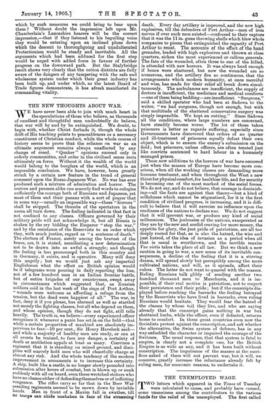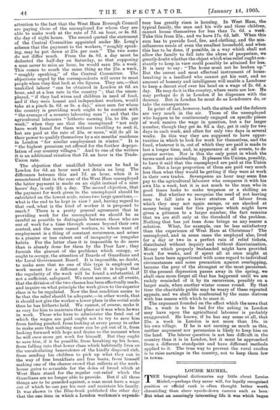T WO letters which appeared. in the Times of Tuesday were
calculated to cause, and probably have caused, some uneasiness among the contributors to the various funds for the relief of the unemployed. The first called attention to the fact that the West Ham Borough Council are paying those of the unemployed for whom they are able to make work at the rate of 7d. an hour, or 4s. 8d. the day of eight hours. The second quoted the statement of the Central Committee appointed under Mr. Long's scheme that the payment to the workers, " roughly speak- ing, may be put down at 25s. per man." The two sums do not differ much. From the 4s. 8d. a day must be deducted the half-day on Saturday, so that supposing a man never to miss an hour, he would earn 26s. a week. This comes to much the same thing as the 25s. a week, " roughly speaking," of the Central Committee. The objections urged by the correspondents will occur to most people when they first look at the figures. They are,—that unskilled labour " can be obtained in London at 6d. an hour, and at a less rate in the country " ; that the unem- ployed, " if they had wives and children in need of food, and if they were honest and independent workers, would take at a pinch 2s. 6d. or 3s. a day," since men for whom the country is providing work ought to be content with " the average of a country labouring man " • and that the agricultural labourers " hitherto earning f5s. to 18s. per week," when they see that the unemployed " not only have work found for them without troubling to seek it, but are paid at the rate of 25s. or more," will do all in their power to qualify themselves by a six months' residence in London " for similar employment in winter." It is " the highest premium yet offered for the further depopu- lation of our country villages." And to one of the writers it is an additional vexation that 7d. an hour is the Trade- Union rate.
The objection that unskilled labour can be had in London for 6d. an hour need not detain us long. The difference between this and 7d. an hour, when it is remembered that in the case of the West Ham unemployed the latter payment is made on an eight instead of a nine hours' day, is only 2d. a day. The second objection, that the .payment for work given to the unemployed should be calculated on the lowest scale, raises two large questions,— what is the end to be kept in view ? and, having regard to that end,'what is the kind of worker it is proposed to reach ? There is a pretty general agreement that in providing work for the unemployed we should be as careful as possible to distinguish between those who are out of work for a time through causes beyond their own control, and the mere casual workers, to whom want of employment is a thing of constant recurrence, and arises to a greater or less extent out of incapacity or irregular habits. For the latter class it is impossible to do more than is already done for them by the Poor Law ; they furnish the gravest of the problems which occupy, or ought to occupy, the attention of Boards of Guardians and the Local Government Board. It is impossible, no doubt, to make sure that no one of this type is employed on work meant for a different class, but it is hoped that the regularity of the work will be found a substantial, if not a sufficient, safeguard. We must assume, at all events, that the division of the two classes has been effectually made, and inquire on what principle the work given to the superior class is to be regulated. Now the first condition seems to be that the relief should be adequate,—in other words, that it should not give the worker a lower place in the social scale than lie has hitherto held. We cannot, of course, make it as easy for him to maintain that place as it was when he was in work. Those who have to administer the fund out of which the wages are paid ought not to try to save him from feeling pinched, from looking at every penny in order to make sure that nothing more can be got out of it, from looking forward with hope and desire to the moment when he will once more get work for himself. But they ought to save him, if it be possible, from breaking up his home, from falling into that lower class which habitually lives on the uncalculating benevolence of the kindly disposed rich, from sending his children to pick up what they can in the way of free breakfasts and free boots, from himself making one of the chance crowd that collects at the work- house gates to scramble for the doles of bread which at West Ham stand for the regular out-relief which the Guardians are no longer able to provide. But if all these things are to be guarded against, a man must have a wage out of which he can pay his rent and maintain his family. It was shown in the Blue-book published the other day that the one item in which a London workman's expendi- ture has greatly risen is housing. In West Ham, the typical family, the man and his wife and three children, cannot house themselves for less than Is. 6d. a week. Take this from 25s., and we have 17s. 6d. left. When this sum has to provide food, fire, and clothing, and the mis- cellaneous needs of even the smallest household, and when this has to be done, if possible, in a way which shall not allow the family to fall into the abyss of pauperism, we greatly doubt whether the object which wise relief ought con- stantly to keep in view could possibly be attained for less. It is easy to say : " The home must not be broken up." But the surest and most effectual instrument of home- breaking is a landlord who cannot get his rent, and no amount of honesty and intelligence will enable a Londoner to keep a decent roof over his head on a wage of 2s. 6d. a day. He may do it in the country, where rents are low. He may perhaps do it in London if he dispenses with the decency. But in London he must do as Londoners do, or take the consequences.
In point of fact, however, both the attack and the defence are very much in the air. Those of the unemployed who happen to be continuously engaged on specific pieces of work receive the wage in question, but a far larger number, though they get 4s. 8d. a day, get it only for two days in each week, and often for only two days in several weeks. In this way they are supposed to have oppor- tunities in which to look for work for themselves, and the fund, whatever it is, out of which they are paid is made to last a longer time, and, in appearance at all events, to do greater service. Nor is this the only point in which the terms used are misleading. It pleases the Unions, possibly, to have it said that the unemployed are paid at the Union rate. But a large proportion of them are paid very much less than what they would be getting if they were at work in their own trades. Sevenpenco an hour may seem fine pay to the agricultural labourer who compares it with his own 15s. a week, but it is not much to the man who in good times looks to make tenpence or a shilling an hour. But whether we recognise the need of not leaving men to fall into a lower stratum of labour from which they may not again escape, or are shocked at money being used for this purpose which might have given a pittance to a larger number, the fact remains that we are still only at the threshold of the problem. Nothing that has yet been done brings us any nearer a solution. What, for example, can be less satisfactory than the experience of West Ham at Christmas ? The unemployed, and in some cases the employed also, lived for a day or two in a perfect rain of relief tickets, distributed without inquiry and without discrimination. Money which properly lrusbanded might have provided work for weeks, and if spent all at once might at least have been apportioned with some regard to individual circumstances and some precaution against overlapping, became the prey of the strongest or the most persistent. If the present depression passes away in the spring, we shall once more forget all that has happened until we are rudely reminded of it by its recurrence, possibly on a larger scale, when another winter comes round. By that time the charitable public may be weary of these repeated appeals, and we shall be confronted by the same distress with less means with which to meet it.
The argument founded on the effect which the news that 25s. a week is to be had for the asking in London may have upon the agricultural labourer is probably exaggerated. He knows, if he has any sense at all, that 25s. a week in London is not more than 18s. in his own village. If he is not earning as much as this, neither argument nor persuasion is likely to keep him on the land. The labour question is not less difficult in the country than it is in London, but it must be approached from a different standpoint and have different methods applied to it. The true way to prevent the rural exodus is to raise earnings in the country, not to keep them low in towns.







































 Previous page
Previous page